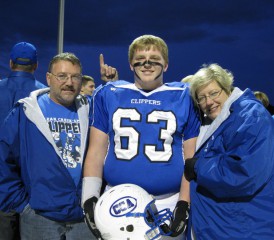Survivor Insight Series: Julie K. Thrives after Early Mesothelioma Diagnosis

Fact Checked | Written by: Tim Povtak | Last Update: 10/23/2024 | 5 Min Read
Julie K. still remembers the conversation vividly. She sat on the side of the bed and worried that her diagnosis of mesothelioma didn’t leave much time.
She wondered who her husband might marry next, and who would be raising Denise, their beautiful 6-year-old daughter.
She wanted the best for both of them.
“I had a long talk with my husband that day, about the type of woman he probably would marry when I was gone. I still wanted him to be happy. And I wanted my daughter to be happy about it, too,” said Julie, whose last name is being withheld over privacy concerns. “You don’t forget those conversations. I remember it like it was yesterday.”
It was 33 years ago.
Julie, now 62 and living contently in Long Island, N.Y., became a miracle mesothelioma survivor, beating a cancer with no cure. Her diagnosis came so unusually early — almost by accident — and the surgery and follow-up radiation so quickly, that the pleural mesothelioma never had a chance to spread.
“I think I had a guardian angel watching over me,” she said. “And the best care I could possibly get. I know how lucky I was.”
Celebrating 42 Years Together
Julie and her husband, Jim, just celebrated their 42nd anniversary.
Denise grew up with the same two loving parents, eventually became a successful real estate agent, and bought her own home not far away. She still sees, or calls, her mother every day.
Julie recently retired, leaving her job as a compliance officer on the New York Stock Exchange to spend more time doting on Jim and their two cats, who are treated like family members.
Her life was changed by mesothelioma, but her life continued.
Her original surgery at Sloan Kettering Hospital in New York removed the small tumor and the entire lining around one of her lungs. She followed with four weeks of intense radiation treatments.
The radiation ignited a thyroid condition for which she has taken medication ever since. The radiation also scared her away from having more children, something she had wanted to do. Back in the late ’70s, though, there was no such thing as targeted radiation.
“We would have liked to have more children, but we couldn’t take the risk,” she said. “They didn’t know exactly what the radiation could do to your body. The toughest part was not knowing.”
Julie still has annual X-rays at Sloan Kettering to make sure the cancer has not returned. He has a blood test every three months. She never regained the full capacity of the one lung, but she goes to sleep now mostly worry free.
“It took me about five years to realize everything was going to be okay. When it first happened, it was overwhelming,” she said. “I got real self centered, which is not me, because I thought the end was coming. I didn’t like the way I had become. And it took awhile to come out of it mentally.”
Mesothelioma is normally an aggressive cancer with a grim prognosis. It typically is not diagnosed until it has spread extensively. It is caused by an exposure to toxic asbestos, although usually striking older men exposed in various occupations.
Asbestos Exposure As a Child
Julie believes her exposure came as a child. Her father was an electrical engineer who used to bring home asbestos insulation to wrap around the radiator pipes they used to heat the older house where she grew up. The head of Julie’s bed was adjacent to the heater.
She would fall asleep not realizing she was breathing in the asbestos fibers that were so close to her pillow. The latency period from exposure to asbestos to a mesothelioma diagnosis can be anywhere from 10 to 50 years.
Julie was fortunate that the mesothelioma tumor in its infancy popped a blood vessel in her chest, which caused the pain that prompted her original hospital visit. She was stunned by the eventual diagnosis.
And she did not handle it well. Fortunately, her family did.
A Great Support Group
Her sister, a psychiatric social worker, taught her to handle and channel her emotions, to keep it from overwhelming her life. She only allowed herself one hour each day to be angry and sad and any way else she wanted to feel about the diagnosis.
Her husband, a teacher, made her set goals, even small ones, immediately after surgery. He didn’t allow her to drown in any pity. Something as small as walking to the end of the driveway was hailed as a major accomplishment in their home.
“The whole thing was really traumatic for my daughter,” she said. “She knew it was something very serious. It was a long time ago, and we don’t really talk about it anymore, but parts of it, I still remember so clearly.”





